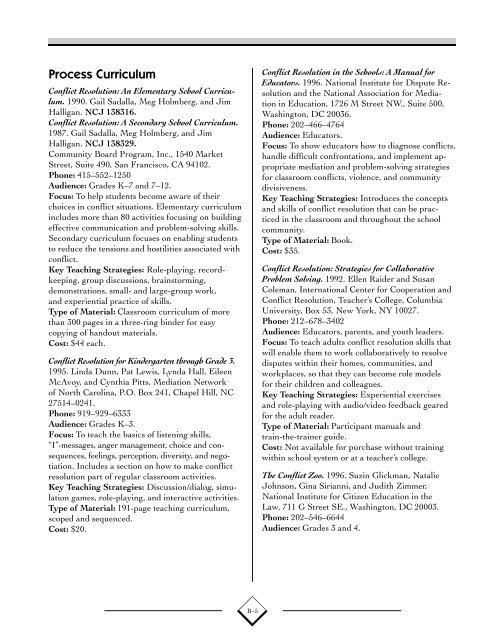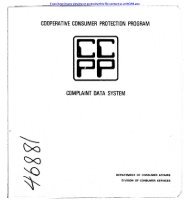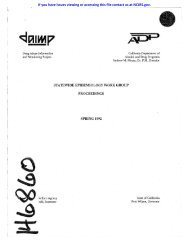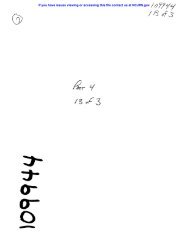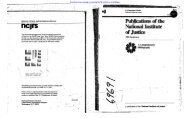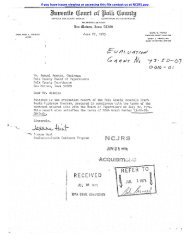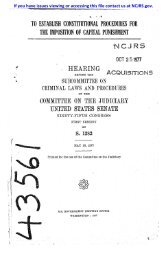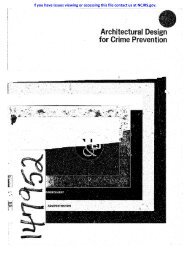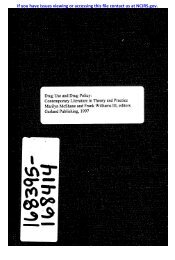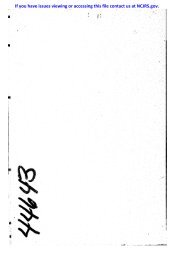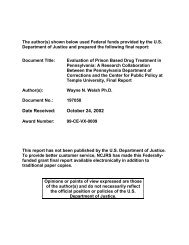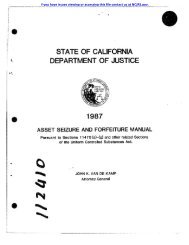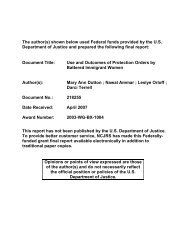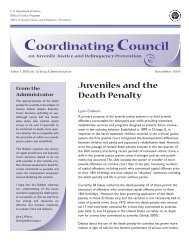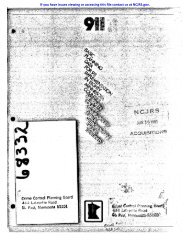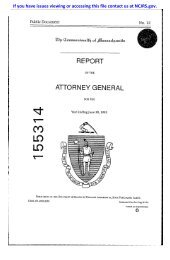Conflict Resolution Education - National Criminal Justice Reference ...
Conflict Resolution Education - National Criminal Justice Reference ...
Conflict Resolution Education - National Criminal Justice Reference ...
Create successful ePaper yourself
Turn your PDF publications into a flip-book with our unique Google optimized e-Paper software.
Process Curriculum<br />
<strong>Conflict</strong> <strong>Resolution</strong>: An Elementary School Curriculum.<br />
1990. Gail Sadalla, Meg Holmberg, and Jim<br />
Halligan. NCJ 138316.<br />
<strong>Conflict</strong> <strong>Resolution</strong>: A Secondary School Curriculum.<br />
1987. Gail Sadalla, Meg Holmberg, and Jim<br />
Halligan. NCJ 138329.<br />
Community Board Program, Inc., 1540 Market<br />
Street, Suite 490, San Francisco, CA 94102.<br />
Phone: 415–552–1250<br />
Audience: Grades K–7 and 7–12.<br />
Focus: To help students become aware of their<br />
choices in conflict situations. Elementary curriculum<br />
includes more than 80 activities focusing on building<br />
effective communication and problem-solving skills.<br />
Secondary curriculum focuses on enabling students<br />
to reduce the tensions and hostilities associated with<br />
conflict.<br />
Key Teaching Strategies: Role-playing, recordkeeping,<br />
group discussions, brainstorming,<br />
demonstrations, small- and large-group work,<br />
and experiential practice of skills.<br />
Type of Material: Classroom curriculum of more<br />
than 300 pages in a three-ring binder for easy<br />
copying of handout materials.<br />
Cost: $44 each.<br />
<strong>Conflict</strong> <strong>Resolution</strong> for Kindergarten through Grade 3.<br />
1995. Linda Dunn, Pat Lewis, Lynda Hall, Eileen<br />
McAvoy, and Cynthia Pitts, Mediation Network<br />
of North Carolina, P.O. Box 241, Chapel Hill, NC<br />
27514–0241.<br />
Phone: 919–929–6333<br />
Audience: Grades K–3.<br />
Focus: To teach the basics of listening skills,<br />
“I”-messages, anger management, choice and consequences,<br />
feelings, perception, diversity, and negotiation.<br />
Includes a section on how to make conflict<br />
resolution part of regular classroom activities.<br />
Key Teaching Strategies: Discussion/dialog, simulation<br />
games, role-playing, and interactive activities.<br />
Type of Material: 191-page teaching curriculum,<br />
scoped and sequenced.<br />
Cost: $20.<br />
B–5<br />
<strong>Conflict</strong> <strong>Resolution</strong> in the Schools: A Manual for<br />
Educators. 1996. <strong>National</strong> Institute for Dispute <strong>Resolution</strong><br />
and the <strong>National</strong> Association for Mediation<br />
in <strong>Education</strong>, 1726 M Street NW., Suite 500,<br />
Washington, DC 20036.<br />
Phone: 202–466–4764<br />
Audience: Educators.<br />
Focus: To show educators how to diagnose conflicts,<br />
handle difficult confrontations, and implement appropriate<br />
mediation and problem-solving strategies<br />
for classroom conflicts, violence, and community<br />
divisiveness.<br />
Key Teaching Strategies: Introduces the concepts<br />
and skills of conflict resolution that can be practiced<br />
in the classroom and throughout the school<br />
community.<br />
Type of Material: Book.<br />
Cost: $35.<br />
<strong>Conflict</strong> <strong>Resolution</strong>: Strategies for Collaborative<br />
Problem Solving. 1992. Ellen Raider and Susan<br />
Coleman, International Center for Cooperation and<br />
<strong>Conflict</strong> <strong>Resolution</strong>, Teacher’s College, Columbia<br />
University, Box 53, New York, NY 10027.<br />
Phone: 212–678–3402<br />
Audience: Educators, parents, and youth leaders.<br />
Focus: To teach adults conflict resolution skills that<br />
will enable them to work collaboratively to resolve<br />
disputes within their homes, communities, and<br />
workplaces, so that they can become role models<br />
for their children and colleagues.<br />
Key Teaching Strategies: Experiential exercises<br />
and role-playing with audio/video feedback geared<br />
for the adult reader.<br />
Type of Material: Participant manuals and<br />
train-the-trainer guide.<br />
Cost: Not available for purchase without training<br />
within school system or at a teacher’s college.<br />
The <strong>Conflict</strong> Zoo. 1996. Suzin Glickman, Natalie<br />
Johnson, Gina Sirianni, and Judith Zimmer,<br />
<strong>National</strong> Institute for Citizen <strong>Education</strong> in the<br />
Law, 711 G Street SE., Washington, DC 20003.<br />
Phone: 202–546–6644<br />
Audience: Grades 3 and 4.


